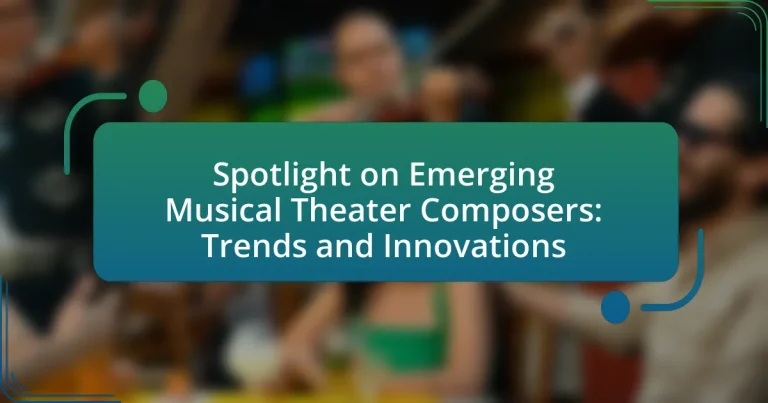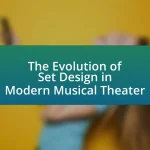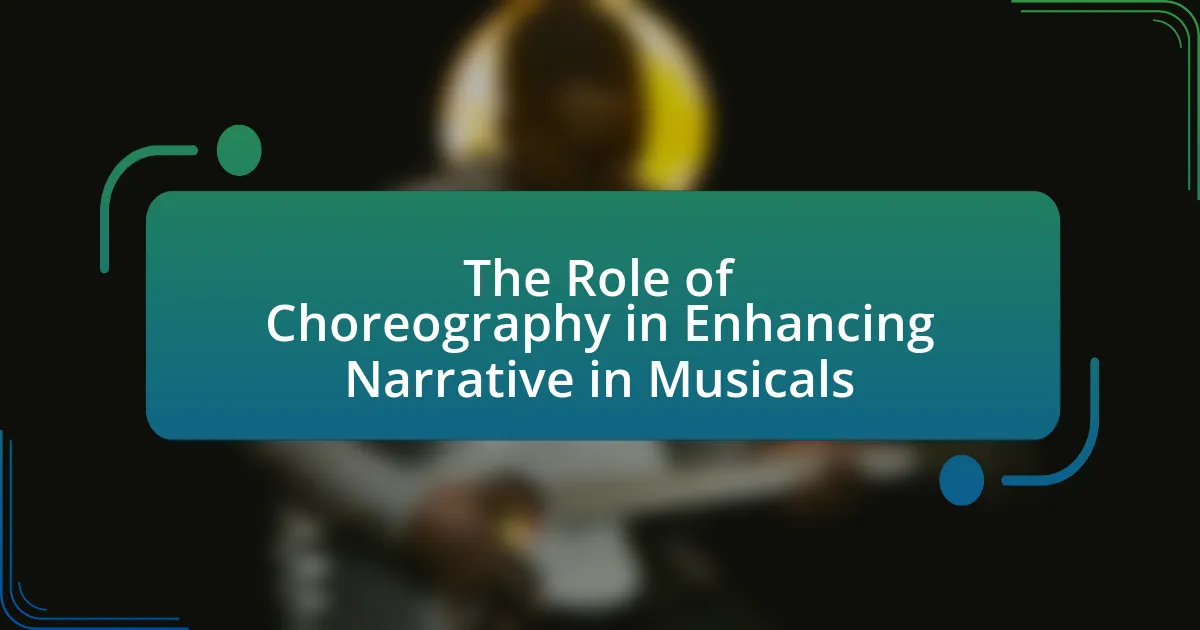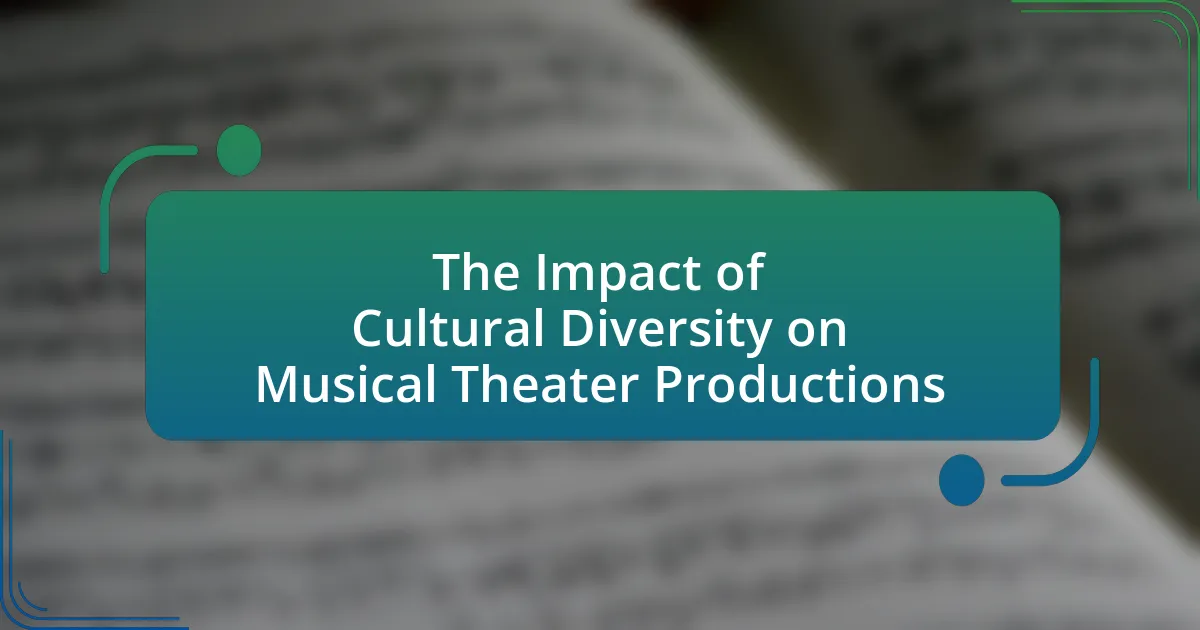Emerging musical theater composers are characterized by their innovative approaches, diverse influences, and collaborative efforts, often incorporating contemporary musical styles such as pop, hip-hop, and electronic music. This article explores the distinctions between emerging and established composers, highlighting how backgrounds shape their compositions and the role of technology in their creative processes. It also examines the themes commonly addressed in their works, such as identity and social justice, and discusses the challenges they face, including financial constraints and competition within the industry. Additionally, the article outlines available support systems and practical steps for aspiring composers to navigate the evolving landscape of musical theater.
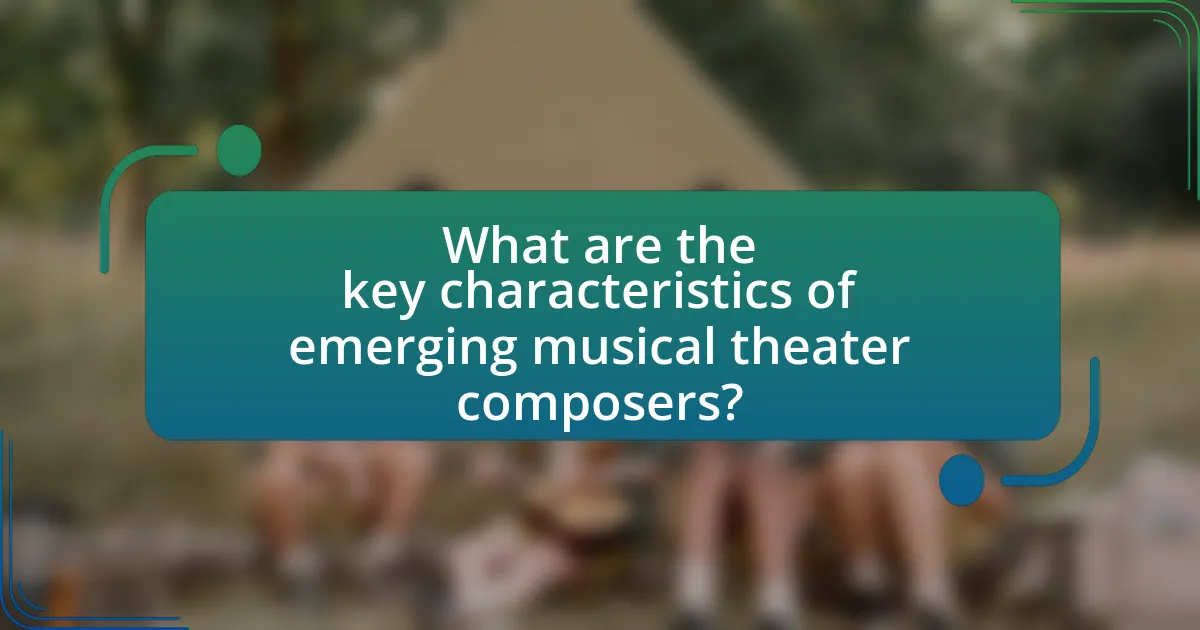
What are the key characteristics of emerging musical theater composers?
Emerging musical theater composers typically exhibit a blend of innovation, diversity, and collaboration. These composers often incorporate contemporary musical styles and genres, reflecting current cultural trends and appealing to a broader audience. For instance, many emerging composers draw inspiration from pop, hip-hop, and electronic music, which can be seen in works like “Dear Evan Hansen” by Benj Pasek and Justin Paul, showcasing a modern sound that resonates with younger audiences. Additionally, these composers frequently collaborate with diverse writers and artists, fostering inclusivity and representing varied perspectives in their narratives. This collaborative approach not only enriches the storytelling but also enhances the musicality of their works, as seen in the partnerships of composers like Lin-Manuel Miranda, who blends different cultural influences in his projects.
How do emerging composers differ from established ones?
Emerging composers differ from established ones primarily in their level of experience and recognition within the industry. Emerging composers often experiment with innovative styles and themes, reflecting contemporary societal issues, while established composers typically have a proven track record and a recognizable signature style that has garnered critical acclaim and audience loyalty. For instance, emerging composers may utilize digital platforms for distribution and audience engagement, which contrasts with established composers who often rely on traditional methods of production and promotion. This distinction highlights the evolving landscape of musical theater, where new voices are increasingly shaping the genre.
What unique styles and influences do they bring to musical theater?
Emerging musical theater composers bring diverse styles and influences that reflect contemporary cultural narratives and innovative musical techniques. For instance, many incorporate elements from genres such as hip-hop, pop, and electronic music, which resonate with younger audiences and expand the traditional boundaries of musical theater. Additionally, composers like Lin-Manuel Miranda have successfully blended historical storytelling with modern musical forms, as seen in “Hamilton,” which utilizes rap and R&B to convey complex themes of identity and social justice. This fusion of styles not only enhances the emotional depth of the narratives but also attracts a broader demographic, thereby revitalizing the musical theater landscape.
How do their backgrounds shape their compositions?
Emerging musical theater composers’ backgrounds significantly shape their compositions by influencing their thematic choices, musical styles, and narrative structures. For instance, composers from diverse cultural backgrounds often incorporate elements from their heritage, resulting in unique soundscapes and storytelling techniques that reflect their personal experiences. A notable example is Lin-Manuel Miranda, whose Puerto Rican heritage informs the rhythms and lyrical styles in “Hamilton,” blending hip-hop with traditional musical theater. Additionally, composers with formal training in classical music may integrate complex harmonies and orchestration, as seen in the works of Jason Robert Brown, who combines pop and jazz influences with classical techniques. These varied backgrounds create a rich tapestry of innovation in contemporary musical theater, showcasing how personal history directly impacts artistic expression.
What role does technology play in their work?
Technology plays a crucial role in the work of emerging musical theater composers by enabling innovative composition, production, and distribution methods. Composers utilize digital audio workstations (DAWs) to create complex scores and orchestrations that were previously difficult to achieve, allowing for greater creative expression. Additionally, technology facilitates collaboration through online platforms, enabling composers to work with musicians and lyricists remotely, thus expanding their creative networks. The use of social media and streaming services also allows composers to reach wider audiences, promoting their work and gaining feedback in real-time. These advancements illustrate how technology not only enhances the creative process but also transforms the way musical theater is produced and consumed.
How are digital tools influencing composition and production?
Digital tools are significantly influencing composition and production by enhancing creativity, streamlining workflows, and enabling collaboration among composers. These tools, such as digital audio workstations (DAWs), allow composers to experiment with sounds and arrangements more freely, leading to innovative musical ideas. For instance, software like Ableton Live and Logic Pro X provides extensive libraries of sounds and effects, which composers can manipulate in real-time, fostering a more dynamic creative process. Additionally, cloud-based platforms facilitate remote collaboration, allowing multiple composers to work on a project simultaneously, regardless of their geographical locations. This shift has been evidenced by the rise of virtual collaborations in the musical theater industry, where emerging composers utilize these technologies to produce high-quality work efficiently.
What platforms are emerging composers using to showcase their work?
Emerging composers are using platforms such as SoundCloud, Bandcamp, and YouTube to showcase their work. These platforms allow composers to reach a wider audience by providing tools for sharing audio and video content. For instance, SoundCloud offers features for streaming and sharing music, while Bandcamp enables direct sales and fan engagement. YouTube serves as a visual medium where composers can present their compositions alongside performances, enhancing visibility and accessibility.
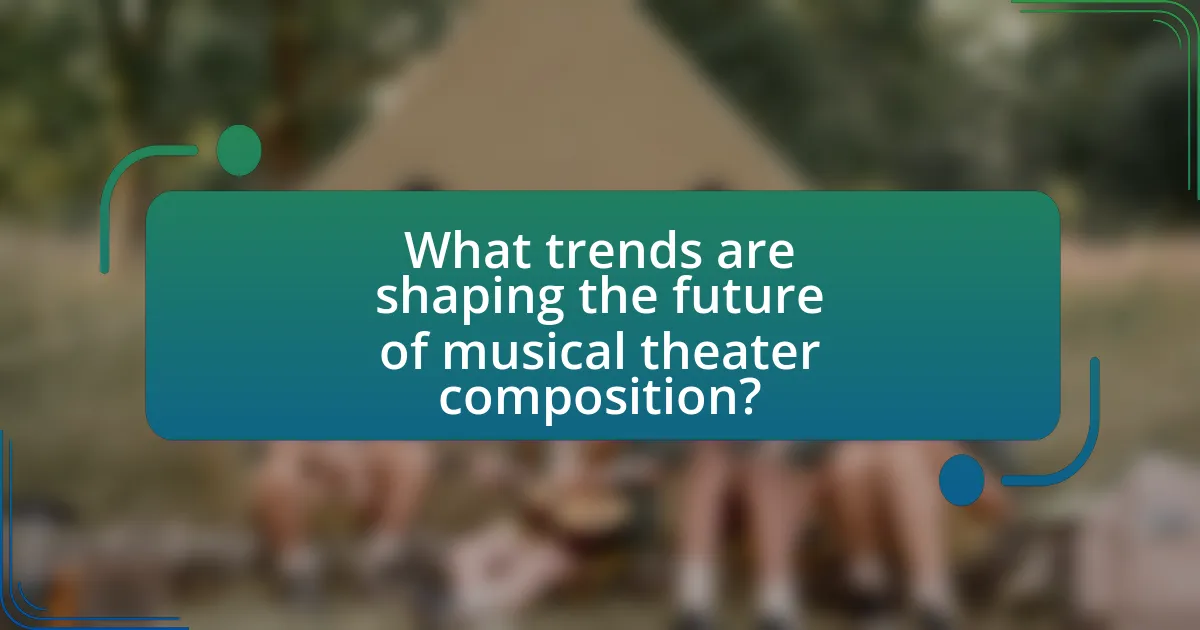
What trends are shaping the future of musical theater composition?
Innovative technology and diverse storytelling are shaping the future of musical theater composition. Composers increasingly utilize digital tools for composition and production, allowing for new soundscapes and accessibility in creating music. Additionally, the incorporation of varied cultural narratives and perspectives reflects a broader representation in storytelling, appealing to wider audiences. For instance, shows like “Hamilton” have demonstrated the success of blending hip-hop with traditional musical theater, showcasing how genre fusion can attract diverse demographics. This trend towards inclusivity and technological integration is expected to continue influencing the evolution of musical theater.
How are social issues reflected in their works?
Emerging musical theater composers reflect social issues in their works by integrating contemporary themes such as identity, inequality, and social justice into their narratives and musical compositions. For instance, composers like Lin-Manuel Miranda address racial and cultural identity through works like “Hamilton,” which explores the complexities of American history and representation. Additionally, shows like “Dear Evan Hansen” by Benj Pasek and Justin Paul tackle mental health and the pressures of adolescence, highlighting the struggles faced by young people today. These composers utilize their platforms to provoke thought and inspire dialogue around pressing societal concerns, thereby making their works relevant and impactful in the context of modern social issues.
What themes are commonly explored by new composers?
New composers commonly explore themes of identity, social justice, and personal struggle. These themes reflect contemporary societal issues and resonate with diverse audiences, as seen in works like “Dear Evan Hansen,” which addresses mental health and belonging, and “Hamilton,” which focuses on race and representation in American history. The exploration of these themes allows new composers to connect emotionally with their audience while pushing the boundaries of traditional musical theater narratives.
How do these themes resonate with contemporary audiences?
Emerging musical theater themes resonate with contemporary audiences by reflecting current societal issues such as identity, mental health, and social justice. These themes are relevant as they address the complexities of modern life, allowing audiences to connect emotionally and intellectually with the narratives presented. For instance, shows like “Dear Evan Hansen” tackle mental health and the pressures of adolescence, which are significant concerns for today’s youth. Additionally, the incorporation of diverse voices and experiences in works by composers like Lin-Manuel Miranda highlights the importance of representation, aligning with contemporary movements advocating for inclusivity and equality. This relevance is evidenced by the increasing popularity of such productions, which often lead to discussions about their themes in social media and public forums, indicating a strong connection with the audience’s values and experiences.
What innovations are being introduced in musical storytelling?
Innovations in musical storytelling include the integration of technology, such as augmented reality and interactive elements, which enhance audience engagement. Emerging composers are utilizing digital platforms to create immersive experiences, allowing audiences to influence the narrative through their choices. For instance, shows like “The Last Five Years” have been adapted into interactive formats, enabling viewers to experience the story from different perspectives. Additionally, the incorporation of diverse musical styles and cultural influences is broadening the narrative scope, as seen in productions like “Hamilton,” which blends hip-hop with traditional musical theater. These innovations reflect a shift towards more dynamic and participatory storytelling methods in contemporary musical theater.
How are new narrative techniques changing the musical theater landscape?
New narrative techniques are transforming the musical theater landscape by enabling more complex storytelling and character development. These techniques, such as non-linear narratives, immersive experiences, and multimedia integration, allow composers and writers to explore themes in innovative ways. For instance, productions like “Dear Evan Hansen” utilize contemporary issues and psychological depth, reflecting real-life struggles and enhancing audience engagement. Additionally, shows that incorporate technology, such as projections and interactive elements, create a more dynamic storytelling environment, as seen in “Hamilton,” which blends historical narrative with modern musical styles. This evolution in narrative approach not only broadens the scope of what musical theater can convey but also attracts diverse audiences, reshaping the industry’s future.
What role does collaboration play in the creative process?
Collaboration is essential in the creative process as it fosters diverse perspectives and enhances innovation. In the context of musical theater, collaboration among composers, lyricists, directors, and performers leads to a richer artistic output, as each participant contributes unique skills and ideas. Research indicates that collaborative environments can increase creativity by up to 15%, as seen in studies conducted by the Harvard Business Review, which highlight the benefits of teamwork in creative industries. This synergy not only improves the quality of the work but also accelerates the development of new trends and innovations in musical theater.
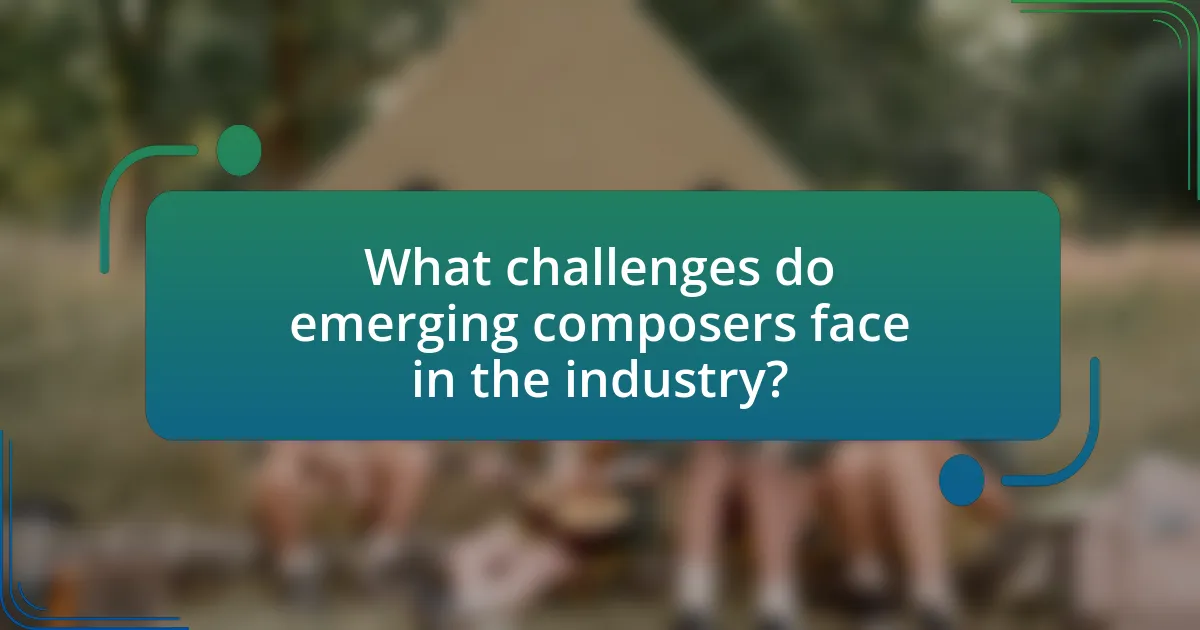
What challenges do emerging composers face in the industry?
Emerging composers face significant challenges in the industry, primarily including limited access to funding, competition for opportunities, and difficulties in establishing a professional network. Limited funding restricts their ability to produce and promote their work, as many rely on grants or personal finances to support their projects. The competition is intense, with numerous talented individuals vying for a small number of available positions in theater productions, making it hard for newcomers to gain visibility. Additionally, establishing a professional network is crucial for collaboration and career advancement, yet many emerging composers struggle to connect with industry veterans and decision-makers, which can hinder their growth and opportunities in the musical theater landscape.
How do financial constraints impact their work?
Financial constraints significantly limit the creative output and opportunities for emerging musical theater composers. These limitations often result in reduced access to resources such as professional development, high-quality production tools, and collaboration opportunities with established artists. For instance, a study by the National Endowment for the Arts found that financial barriers can restrict composers from participating in workshops or festivals that are crucial for networking and skill enhancement. Consequently, these constraints can hinder their ability to produce innovative works and gain visibility in a competitive industry.
What funding opportunities are available for new composers?
New composers can access various funding opportunities, including grants, fellowships, and competitions specifically designed for emerging artists. Organizations such as the American Composers Forum and the National Endowment for the Arts offer grants that support the creation of new works. Additionally, programs like the ASCAP Foundation provide fellowships and funding for composers to develop their projects. Competitions, such as the BMI Musical Theatre Workshop, also offer financial support and mentorship to new composers, helping them to advance their careers in musical theater.
How can emerging composers navigate the competitive landscape?
Emerging composers can navigate the competitive landscape by leveraging networking opportunities, utilizing digital platforms for exposure, and continuously honing their craft. Networking allows composers to connect with industry professionals, which can lead to collaborations and mentorships that enhance their visibility. Digital platforms, such as social media and music streaming services, provide avenues for sharing their work with a broader audience, increasing their chances of being discovered. Additionally, ongoing education and practice in composition techniques and trends ensure that composers remain relevant and innovative in a rapidly evolving industry. These strategies are supported by the fact that many successful composers attribute their breakthroughs to strong professional relationships and effective self-promotion through digital channels.
What support systems exist for new musical theater composers?
Support systems for new musical theater composers include mentorship programs, workshops, grants, and festivals dedicated to emerging artists. Organizations like the Dramatists Guild and the National Alliance for Musical Theatre provide resources and networking opportunities. Additionally, programs such as the BMI Musical Theatre Workshop and the Johnny Mercer Foundation offer guidance and support for composers to develop their work. These systems are crucial for fostering talent and providing the necessary tools for success in the competitive landscape of musical theater.
How do mentorship programs benefit emerging talent?
Mentorship programs benefit emerging talent by providing guidance, industry insights, and networking opportunities essential for career development. These programs connect less experienced individuals with seasoned professionals who share knowledge about the intricacies of the musical theater industry, including composition techniques, market trends, and audience engagement strategies. Research indicates that 70% of mentored individuals report increased confidence and improved skills, which directly correlates with enhanced career advancement opportunities. Additionally, mentorship fosters a supportive environment that encourages creativity and innovation, crucial for emerging musical theater composers navigating a competitive landscape.
What resources are available for skill development and networking?
Resources available for skill development and networking in the context of emerging musical theater composers include workshops, online courses, and industry conferences. Workshops, such as those offered by the Dramatists Guild, provide hands-on experience and mentorship from established composers. Online platforms like Coursera and MasterClass offer courses specifically tailored to musical theater composition, allowing composers to learn at their own pace. Additionally, industry conferences like the National Alliance for Musical Theatre’s annual conference facilitate networking opportunities with industry professionals, fostering connections that can lead to collaborations and career advancement. These resources are essential for composers to enhance their skills and expand their professional networks.
What practical steps can aspiring composers take to succeed?
Aspiring composers can succeed by actively networking within the music industry, honing their craft through continuous education, and creating a diverse portfolio of work. Networking is crucial as it opens doors to collaborations and opportunities; for instance, attending industry events and joining composer organizations can lead to valuable connections. Continuous education, such as taking courses in music theory, composition, and technology, enhances skills and keeps composers updated on industry trends. Additionally, a diverse portfolio showcasing various styles and formats, including original compositions and arrangements, demonstrates versatility and creativity, which are essential in the competitive landscape of musical theater.
